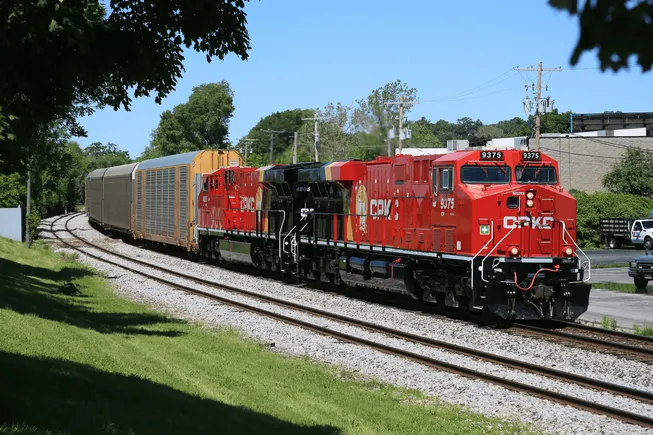Listen to the article
This audio is auto-generated. Please let us know if you have feedback.
Canadian Pacific Kansas City will update its inventory data and restore network fluidity as part of its plan to remedy service disruptions in the southern region of CPKC’s network, per a June 20 report to the Surface Transportation Board.
The railroad carrier has been facing technology changeover-related issues since the consolidation of CPKC’s U.S. information technology systems on May 3, according to the report. Canadian Pacific merged with Kansas City Southern in 2023, creating a railway that connects the U.S. with Mexico and Canada. As part of the merger terms outlined in 2023, CPKC was to expand its network capacity and integrate its IT systems.
In a June 17 letter addressed to CPKC, the board noted that its oversight data showed higher terminal dwell times at rail yards, slower average velocity and lower on-time performance as a result of the issues. STB further noted that customers were reporting elevated delays, missed switches and congestion issues.
Network disruptions
CPKC said it has been tackling problem areas since the date of the switchover to restore service levels.
Data quality was a key issue for CPKC, driven by a difficulty to maintain accurate car inventories and up-to-date locations on railcars, per the document. Interchange data for some connecting carriers also experienced difficulties for cars being delivered to the railroad at legacy-KCS locations, since the processing required an extensive data rework.
The data gaps meant that the necessary work orders could not be created until the data was re-worked manually. The issues then prompted congestion challenges at customer facilities and classification yards across the legacy-KCS network as railcards could not be properly processed. In turn, congestion was reflected in higher yard inventories, increased dwell times, lower train speeds and a surge in locomotive and crew resources to help keep traffic moving.
Early instances of delays and congestion prompted a feedback loop, further exacerbating the situation. CPKC noted in the document that yard congestion made it more challenging to locate individual railcars routed for customer facilities, for instance.
CPKC’s Service Action Plan
Service restoration efforts will fall into two broad categories, much of which has already been implemented, the railroad told the STB. First, CPKC will update inventory data so operating personnel and customers can generate waybills, which serve as a record of shipment origin, destination and other details. The railroad will also focus on restoring network fluidity after data gaps spurred during the IT system change compromised operations.
To address data quality issues, CPKC has deployed cross-function “SWAT-like” support teams composed of operations, IT, network support and marketing and sales experts. The teams were sent to several locations across the network facing issues, and worked with partners to improve the quality of submitted data for cars delivered to the legacy network by:
- Restoring missing car inventory data through field assessments of cards in yards and customer facilities across the legacy-KCS network.
- Assisting customers with re-billing railcars using correct fields and input data.
- Educating local operating personnel on how to properly use CPKC’s IT systems and tablet interfaces to build and complete work orders and assignments.
In terms of network fluidity, CPKC has:
- Routed railcars to bypass its Shreveport Yard in Louisiana, enabling Shreveport to focus on processing the backlog on the legacy-KCS network.
- Enabled personnel to use CPKC’s legacy-CP portion of the network to help organize the delivery and pick up railcars at customer facilities.
- Embargoed railcars routed for customer facilities where the inventory of railcars precluded the receipt of additional cars.
As of June 20, CPKC teams are focused on operations in the Artesia, Mississippi, area, where improvement is lagging, per the report. CPKC is also updating track identifications in complex terminal areas, including tracks initially used by customers for storage that were not properly marked in KCS’s legacy management control system.
Although CPKC stated that it is “too early to offer firm predictions” regarding a full return to service, the carrier said operations should be fixed by mid-July. CPKC also reported that overall service levels have shown signs of improvement after efforts taken to stabilize operations since the transition.
In addition to its monthly service metric reports, CPKC will submit a weekly report that logs recovery efforts and performance data to the Surface Transportation Board for as long as the service issues persist, per the statement.


